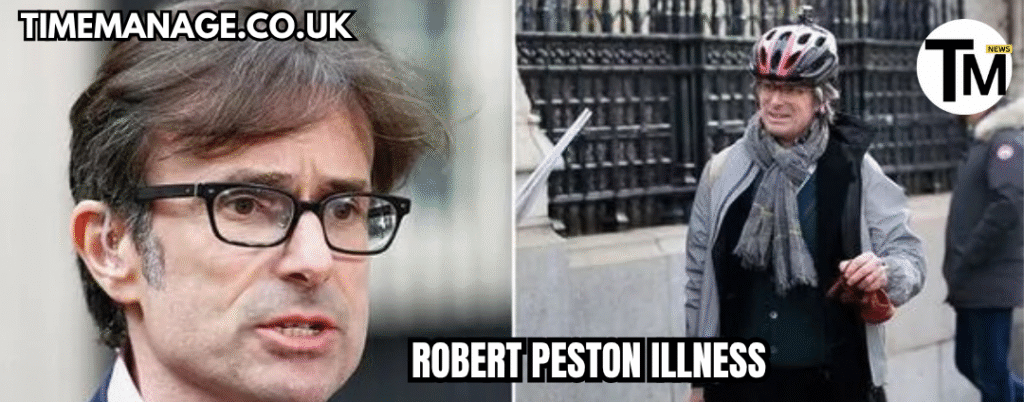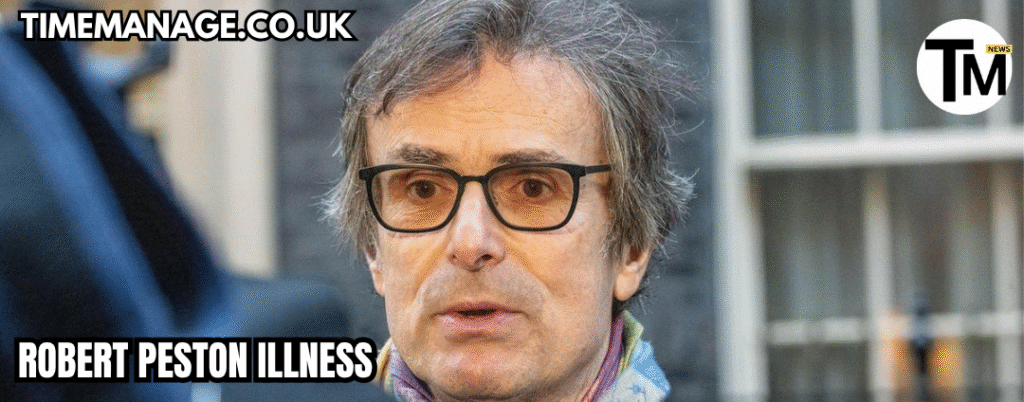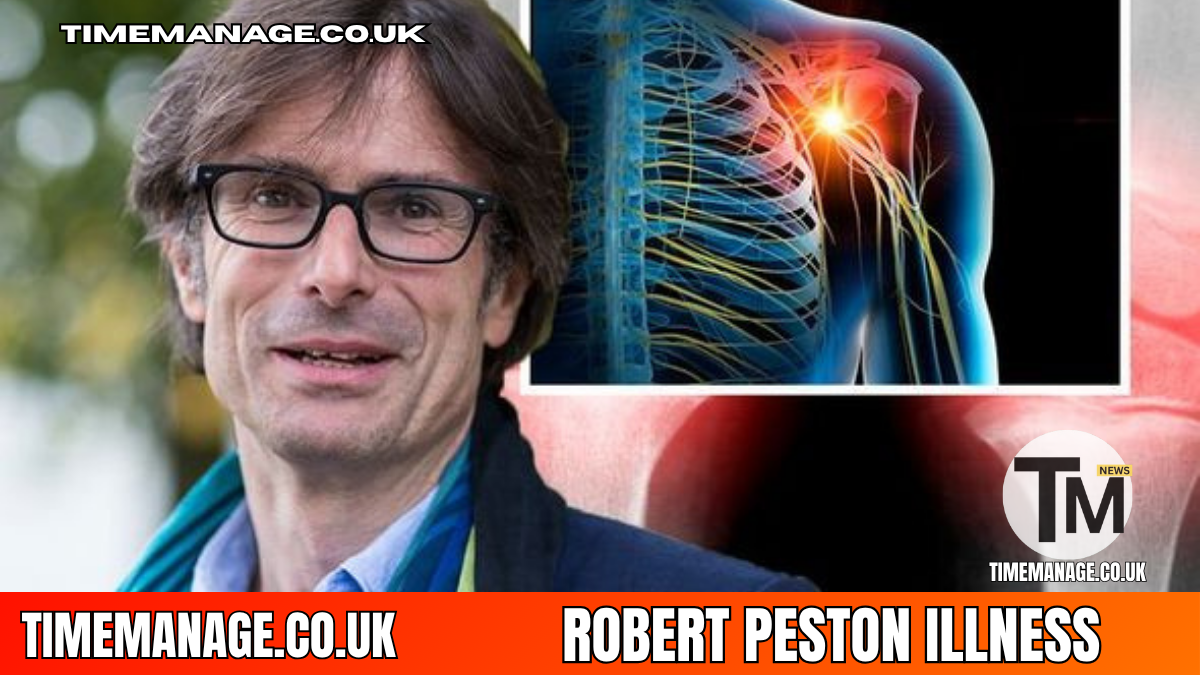robert peston illness, the well-known British journalist and ITV Political Editor, is one of the most respected figures in UK broadcasting. His commanding voice, sharp analysis, and distinctive speaking style have made him a household name. However, behind his confident public image lies a personal story of illness, grief, and mental health challenges that few fully understand.
In this article, we’ll explore the real story behind robert peston illness — his emotional collapse after his wife’s death, his battles with OCD and ADHD, and the lessons he’s shared about mental and physical health. This post compiles verified information from credible sources like The Guardian, Yorkshire Post, and ITV News, ensuring readers get accurate and helpful insight.
Who Is robert peston illness?
robert peston illness James Kenneth Peston was born on April 25, 1960, in London, England. He is best known as ITV’s Political Editor and host of the weekly program Peston, where he interviews political leaders and analyzes current affairs. Before joining ITV, he worked for the BBC as the Business Editor and later as Economics Editor.
He has also written several books, including How Do We Fix This Mess?, Brown’s Britain, and Who Runs Britain?, which explore UK politics and the economy.
But robert peston illness story is more than his career. His life changed dramatically after the death of his wife, Siân Busby, in 2012 — an event that triggered both emotional and physical health challenges.
The Illness After His Wife’s Death
robert peston illness was married to the novelist Siân Busby from 1998 until her death in September 2012 from lung cancer. Her passing deeply affected him. Only weeks after losing her, Peston experienced a sudden and severe health collapse that landed him in hospital.
In a revealing interview with The Guardian (2023), Peston said:
“Soon after my wife died, I became very ill. I was hospitalised with some weird condition. I couldn’t move. All my joints swelled up. I was in intense pain.”
He went on to describe the episode as his body’s reaction to emotional trauma. The doctors couldn’t immediately identify the cause, and he referred to it as a “mystery illness.” The timing and symptoms suggested that his physical breakdown was directly tied to years of suppressed grief, stress, and exhaustion.
Although he recovered physically, the experience changed him. Peston realized that ignoring emotional pain could have devastating consequences on both mind and body. Since then, he has become more open about mental health and self-care.
robert peston illness Battle with Mental Health
1. Living with Obsessive-Compulsive Disorder (OCD)

robert peston illness has openly discussed living with Obsessive-Compulsive Disorder (OCD) since his teenage years. OCD is a mental health condition characterized by intrusive thoughts and compulsive behaviors.
Peston revealed that his OCD often made daily routines difficult. He would repeatedly check doors, gas stoves, and locks, unable to stop himself from returning over and over to ensure safety. In his words, “It never goes away completely.”
He admitted that during high-stress periods, especially following his wife’s illness and death, his OCD symptoms became worse. Over time, therapy and awareness helped him manage it better, but he continues to experience occasional flare-ups.
2. ADHD and Neurodiversity
In recent interviews, robert peston illness also revealed that he has Attention Deficit Hyperactivity Disorder (ADHD) — a condition that affects focus, organization, and impulse control.
He says that ADHD has shaped the way he thinks and works. Peston described his mind as “always racing,” with constant streams of ideas. While that can make focus challenging, it also gives him creativity, energy, and the ability to hyperfocus on complex political issues.
“Having ADHD has helped me in my career,” he told The Newsletter. “It keeps me energetic and curious. My brain is always searching for connections.”
Peston’s candid discussion of ADHD has encouraged many professionals to embrace neurodiversity as a strength rather than a weakness.
3. Coping with Anxiety and Burnout
Alongside OCD and ADHD, Peston has experienced anxiety — often linked to his perfectionist tendencies and demanding career. The high pressure of political journalism, combined with personal loss, pushed him to his limits.
In interviews with The Yorkshire Post, Peston admitted that he initially threw himself into work to avoid facing his grief. But the suppressed emotion eventually manifested as illness and exhaustion.
He now emphasizes the importance of slowing down, processing emotions, and seeking help when needed.
“Good therapy can be incredibly helpful in helping one understand who one is and how to become more resilient,” Peston said.
The Physical Illness: Stress and the Body’s Breaking Point
robert peston illness post-grief illness remains one of the most dramatic episodes in his life. The sudden swelling of joints and pain that left him unable to move illustrates how stress and grief can manifest physically.
Doctors reportedly struggled to find a medical explanation. Peston has said he now believes it was his body’s way of forcing him to stop and rest after years of emotional pressure.
This connection between emotional trauma and physical health — known as the mind-body link — is well documented in medical literature. Peston’s experience is a reminder that ignoring mental strain can lead to physical breakdown.
Since that incident, he has become a vocal advocate for mental wellness, often encouraging people to talk about their struggles rather than hide them.
robert peston illness and COVID-19
In 2021, robert peston illness also tested positive for COVID-19, despite being double-vaccinated. He announced it publicly to raise awareness that even vaccinated people could still contract the virus.
Fortunately, his symptoms were mild, and he recovered at home without needing hospitalization. The journalist used the moment to highlight the importance of transparency about health and the continuing need for caution during the pandemic.
The Role of Therapy and Support
After his wife’s death and his mysterious illness, Peston turned to therapy and counseling. He has since spoken openly about the benefits of psychotherapy in dealing with grief and trauma.
He explained that therapy helped him understand not only his emotions but also his personality traits — such as his obsessive tendencies and ADHD-related impulsiveness. This self-awareness, he said, allowed him to become calmer, more balanced, and more empathetic.
Today, Peston continues to advocate for therapy and encourages people, especially men, to seek professional help without shame.
How Illness Changed robert peston illness Life

robert peston illness experience with illness and mental health challenges profoundly changed how he approaches life and work. Here are some of the main lessons he has shared:
1. Emotional Awareness
He learned that suppressing emotions can be dangerous. Processing grief and stress openly is healthier than ignoring them.
2. Work-Life Balance
Peston admitted that for years he was a workaholic, constantly chasing deadlines. His illness forced him to slow down and recognize the importance of rest.
3. Empathy and Connection
Experiencing pain and loss gave him deeper empathy for others — something that comes through in his interviews and writing.
4. Public Honesty
By speaking openly about OCD, ADHD, and grief, Peston has helped break the stigma surrounding mental health, especially among men in demanding professions.
5. Resilience
Despite everything, he remains one of the UK’s leading journalists, proving that illness does not define a person’s potential or career success.
Timeline of robert peston illness Health Challenges
| Year / Period | Health Issue | Key Details |
| Teenage years | OCD | Developed compulsive behaviors such as checking and repetitive rituals. |
| Adulthood | ADHD | Later diagnosed; describes constant mental activity and hyperfocus. |
| 2012 | Emotional and physical collapse | Hospitalized after wife’s death with joint pain and inflammation. |
| 2012–2015 | Therapy and recovery | Underwent grief counseling and psychotherapy. |
| 2021 | COVID-19 infection | Mild case despite vaccination; recovered fully. |
robert peston illness Today: Advocacy and Awareness
Today, robert peston illness continues his work as ITV’s Political Editor and host of Peston. He remains active, sharp, and engaged in political journalism, but he approaches life differently.
He often speaks about mental health awareness, work-life balance, and the importance of recognizing neurodiversity. His openness helps normalize conversations around conditions like OCD and ADHD in professional circles.
Despite the challenges he’s faced, Peston remains optimistic. His journey shows that vulnerability does not equal weakness — it’s a sign of strength and humanity.
Lessons from robert peston illness Story
The story of robert peston illness holds several key lessons for anyone facing emotional or physical struggles:
- Grief affects the body and mind – Emotional pain can have real physical consequences if left unaddressed.
- Mental health matters – OCD, ADHD, and anxiety require attention, not denial.
- Therapy works – Professional help can guide healing and self-understanding.
- Talking saves lives – Sharing experiences helps others feel less alone.
- Resilience is learned – Recovery is not a single event but a continuous process.
Frequently Asked Questions (FAQ)
1. What illness did robert peston illness have?
robert peston illness suffered a severe but unexplained physical illness shortly after his wife’s death in 2012. He described it as a “weird condition” where his joints swelled and he was in extreme pain. Doctors never identified a specific cause, and Peston believes it was brought on by emotional stress and grief.
2. Does robert peston illness have OCD?
Yes. Robert Peston has spoken publicly about having Obsessive-Compulsive Disorder (OCD) since his teens. He still manages it today through awareness and lifestyle balance.
3. What mental health conditions does robert peston illness have?
Peston has both OCD and ADHD. He says ADHD gives him energy and creativity but can also make it hard to focus. He has learned to view it as both a challenge and a strength.
4. Did robert peston illness have COVID-19?
Yes. In 2021, robert peston illness tested positive for COVID-19 despite being vaccinated. His symptoms were mild, and he recovered quickly.
5. How did illness affect robert peston illness career?
His illnesses made him more reflective and empathetic. While he continues his successful broadcasting career, he now speaks openly about mental health, therapy, and emotional well-being, helping to reduce stigma in the media industry.
Final Thoughts
robert peston illness journey through illness and mental health challenges is a story of courage and transformation. From losing his wife and enduring a mysterious physical illness to managing lifelong OCD and ADHD, he has shown remarkable strength and openness.
His story reminds us that even the most successful public figures face unseen battles. By speaking out, robert peston illness has become not only a respected journalist but also a symbol of resilience, vulnerability, and hope.
Whether dealing with grief, anxiety, or burnout, his message is clear: talk about it, seek help, and never underestimate the power of emotional honesty.





